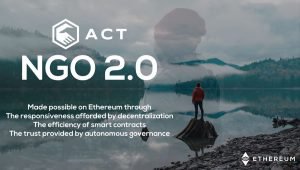PR: ACT Is NGO 2.0 – Bringing Power Back to the People
source: Bitcoin News
2017. Jul. 17. 14:00

This is a paid press release, which contains forward looking statements, and should be treated as advertising or promotional material. Bitcoin.com does not endorse nor support this product/service. Bitcoin.com is not responsible for or liable for any content, accuracy or quality within the press release.
ACT, an Ethereum blockchain based social action platform, is powered by smart contracts, which facilitate a decentralized proposal curation and voting system.
The ACT DAO is more responsive and efficient than non-governmental organizations (NGOs). Trust is guaranteed through autonomous governance meaning no one person controls the fate of the many. According to ACT’s founder, Fraser Brown from Northern Ireland,
“ACT is not a variant of the NGO model – it recreates it.”
ACT is about we as citizens taking ownership of our shared global challenges. It offers the ability for us to aggregate our resources to change everything. Smart contracts replace out-of-reach people who dominate NGO decision-making. ACT will fund change at any speed, and at any scale. ACT is not scared to take on the biggest players and the biggest challenges because it cannot be stopped – it is a decentralized autonomous organisation.
This vision is only possible through the responsiveness afforded by decentralisation, the efficiency of smart contracts, and the trust provided by autonomous governance.
ACT could be described as a version of Change.org or Avaaz that funds action as its core function rather than looking for signatures for online petitions.
Despite the presence of many models for crowdfunding, such as Kiva, GoFundMe, and Kickstarter, communities in need face a lot of obstacles such as transaction costs, bank inadequacies, currency risk, and the number of steps involved in most centralised processes. In contrast, ACT pays curator-vetted proposals instantly and directly. ACT’s unique new model for crowdfunding also guarantees security and transparency through the Ethereum blockchain.
Think about people wanting to donate money to causes. They could give $10 to a fundraiser on the street or an online campaign, or maybe they get tempted by a “sensational” ad and donate. Often then they get called, emailed and snail-mailed constantly by ever more efficient “sales conversion” systems. All the time, they harbour suspicions that most of what they donate won’t reach the ground. And in many cases, they are right.
Think too of communities or individuals on the front line of campaigns to drive change. How do they get resources? They often write hundreds of proposals, and maybe get one or two responses weeks or months down the road. Even if successful, they typically have to jump through hoops to satisfy one committee after another to get “sign off”. This model will never drive the extent or speed of change that we need to see happen.
According to Brown, who is an Irish Olympian,
“Change is normally driven by communities themselves. These communities need real financial support and that is what ACT can provide at any scale, without obstacles, and at a pace appropriate to the challenges faced.”
Users worldwide fund ACT by buying votes. Once quality proposals have passed through the curation engine supporters are notified via their smartphone app and can vote. The proposal is funded out of the pooled funds by a smart contract once a quorum of “yes” votes is hit. 15% of the pooled funds are distributed to the proposal curators by a smart contract where an algorithm evaluates the curator’s effort. In this way, the platform inherently promotes proposal quality.
ACT’s decentralized trust and curation system uses smart contracts, which essentially means that the code makes consistent and fair decisions. This creates trust between proposal makers and people funding the platform because everyone knows that there is no centralised person or organisation in the middle.
The ACT team wants the project to become about real change on the ground as fast as possible. It now confirms that the team is already in discussions with a community from Wales focused on halting open cast coal mining, and a charity in Belarus focused on the rights of people with disabilities.
ACT is currently live on the WINGS.ai platform where a community of crypto investors are evaluating the project. The median forecast for what ACT will raise during its pre-ICO is currently 15000 ETH. About this exciting development, Boris Povod, President of the WINGS Foundation Council said,
“ACT is a truly innovative concept in the cryptocurrency space focused on social good. We designed WINGS to allow people from all over the world to value and promote projects they believe in and are excited to have such a strong team comprised of ACT and their partner Draglet GmbH to be presented to the WINGS community.”
ACT COO Ian Cunningham summing up what ACT means to the non-profit sector said,
“With no centralized Authority, this model literally makes the NGO entity as we know it unnecessary, while holding onto everything good about the idea of an NGO.”
ACT’s mission is to drive global change by supporting citizen action. It does this through a reliable, transparent and decentralized platform open to citizens worldwide.
Everyone should be part of the ACT DAO.
Press Contact Email Address contact@daoact.org Supporting Link www.daoact.org
This is a paid press release. Readers should do their own due diligence before taking any actions related to the promoted company or any of its affiliates or services. Bitcoin.com is not responsible, directly or indirectly, for any damage or loss caused or alleged to be caused by or in connection with the use of or reliance on any content, goods or services mentioned in the press release.
The post PR: ACT Is NGO 2.0 – Bringing Power Back to the People appeared first on Bitcoin News.





